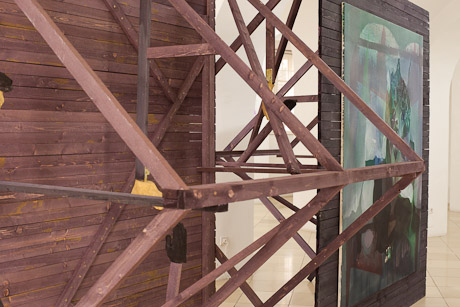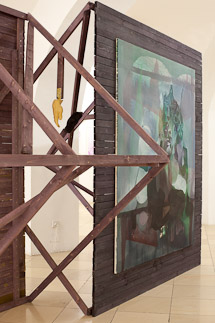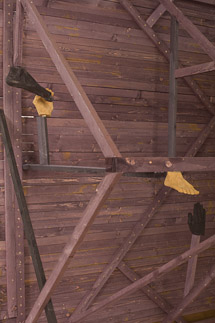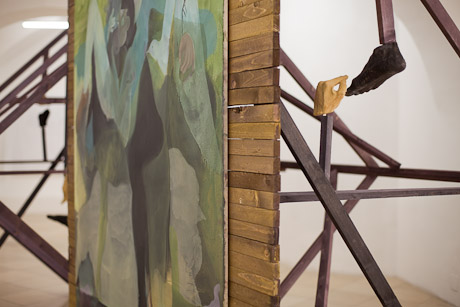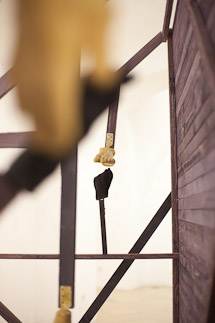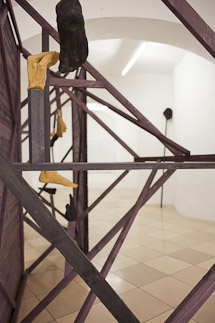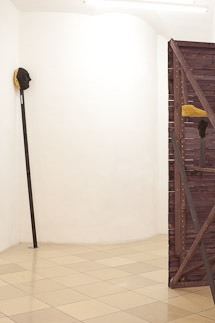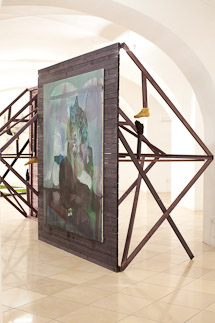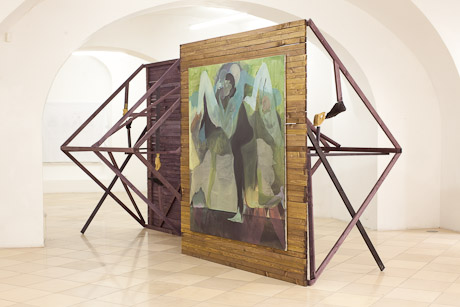 |
Whether we live or whether we die 2012
MATERIALS:
wood, plaster, paintings
size variable
EXHIBITION:
TEMPTED TO DOUBT
University of Applied Arts, Vienna
Know then thyself, presume not God to scan, The proper study of mankind is man.
– Alexander Pope An Essay on Man Epistle II
Daniel Domig explores social factors and building relationships as an aspect of the human condition through painting archetypal forms and paradigmatic figures. Metaphorically as well as literally, he is trying to discover where one person starts and another begins. Primarily, Domig depicts the human body in his work, but is aware of the treacherousness of figuration. As painting is both illustrative and narrative, it elevates the image to an object that it supposedly illustrates. In this process, as Giles Deleuze discusses about Francis Bacon, the eye is subordinated to the model of recognition and loses the immediacy of sensation. Domig avoids that trap; he creates the "presence" of a figure, a visual feeling or visual aura which is very conscious in the reception of the viewer, without using obvious forms to bring it into existence. Antipodally, the adroitness of his command of this technique bears witness to innumerable hours of anatomical drawing.
Domig integrates variegated emotions and experiences in psychological layers, making it difficult to unravel or decipher the paintings quickly. This, in turn, heightens and prolongs the delight of the viewing experience. From early on, Domig was clear that he wanted to paint and to study painting. "I love painting. I'm happy to be alone with a canvas and paint." This enthusiasm radiates from his work, despite the often dark and somber palette. Oil paint is his preferred medium, highly thinned down, desaturated and very fluid, in order to create a matte, satin surface. Domig takes the meaning or process of painting solemnly, letting the painting create itself. He uses no source material or sketches. Before approaching the canvas, he tries to clear himself of preconceptions. Domig describes the procedure as starting anywhere without a fixed idea, finding and feeding in ideas while working, not executing what was already thought out. He is fully process oriented, and goes so far as to start with a blank canvas, not even a white canvas; his quest begins on unprimed ground.
As a result of his intense adventures in the studio, where everything is "dirty" and spontaneous, Domig began to perceive the "perfect", clean and orderly exhibition situation as almost hypocritical. To bridge that contradiction, he started building installations where one can see the back of the painting, see it in a structure as a part of something bigger, instead of isolated and perfect on the wall. Using the exhibition space as a raw material, he builds up an experience for his own sensibility and is able to present his work in a more synchronized way. After the installation is dismantled, he sometimes continues to paint on the canvases. With his installations, animations, videos and works on paper, spokes of the wheel around the nucleus of painting, Daniel Domig continues, ever striving, to break up reception routines.
© Text: Renée Gadsden, 2012
|


